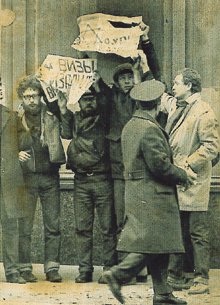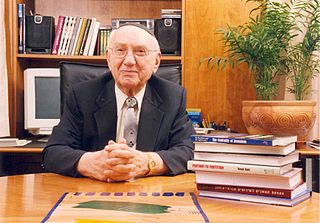Related Research Articles

The Jewish Defense League (JDL) is a Jewish far-right religious-political organization in the United States, whose stated goal is to "protect Jews from antisemitism by whatever means necessary". It has been classified as "a right wing terrorist group" by the FBI since 2001, and is designated a hate group by the Southern Poverty Law Center. According to the FBI, the JDL has been involved in plotting and executing acts of terrorism within the United States. Most terrorism watch groups classify the group as inactive.

Refusenik was an unofficial term for individuals—typically, but not exclusively, Soviet Jews—who were denied permission to emigrate, primarily to Israel, by the authorities of the Soviet Union and other countries of the Eastern bloc. The term refusenik is derived from the "refusal" handed down to a prospective emigrant from the Soviet authorities.
Mizrahi Jews, also known as Mizrahim (מִזְרָחִים) or Mizrachi (מִזְרָחִי) and alternatively referred to as Oriental Jews or Edot HaMizrach, are a grouping of Jewish communities comprising those who remained in the Land of Israel and those who existed in diaspora throughout and around the Middle East and North Africa (MENA) from biblical times into the modern era.
Union of Councils for Jews in the Former Soviet Union (UCSJ) is a non-governmental organization that reports on the human rights conditions in countries throughout Eastern Europe and Central Asia, exposing hate crimes and assisting communities in need. UCSJ uses grassroots-based monitoring and advocacy, as well as humanitarian aid, to protect the political and physical safety of Jewish people and other minorities in the region. UCSJ is based in Washington, D.C., and is linked to other organizations such as the Moscow Helsinki Group. It has offices in Russia and Ukraine and has a collegial relationship with human rights groups that were founded by the UCSJ in the countries of the former Soviet Union.

Avraham Haim Yosef (Avi) haCohen Weiss is an American Open Orthodox ordained rabbi, author, teacher, lecturer, and activist who led the Hebrew Institute of Riverdale in The Bronx, New York until 2015. He is the founder of Yeshivat Chovevei Torah for men and Yeshivat Maharat for women, rabbinical seminaries that are tied to Open Orthodoxy, a breakaway movement that Weiss originated, which is to the left of Modern Orthodox Judaism and to the right of Conservative Judaism. He is co-founder of the International Rabbinic Fellowship, a rabbinical association that is a liberal alternative to the Orthodox Rabbinical Council of America, and founder of the grassroots organization Coalition for Jewish Concerns – Amcha.

Nativ, or officially Lishkat Hakesher or The Liaison Bureau, is an Israeli governmental liaison organization that maintained contact with Jews living in the Eastern Bloc during the Cold War and encouraged aliyah, immigration to Israel.

Nehemiah Levanon was an Israeli intelligence agent, diplomat, head of the aliyah program Nativ, and a founder of kibbutz Kfar Blum. Originally a native of Latvia, he immigrated to the Mandatory Palestine in 1938. After Israel's independence in 1948, Levanon served in a variety of roles to encourage the well-being and emigration of Soviet Jewry. Due to the covert nature of his work, Levanon's decades of service were largely unknown until after his retirement, during the last days of the Soviet Union.
Jacob (Yaakov) Birnbaum was the German-born founder of Student Struggle for Soviet Jewry (SSSJ) and other human rights organizations. Because the SSSJ, at the time of its founding, in 1964, was the first initiative to address the plight of Soviet Jewry, he is regarded as the father of the Movement to Free Soviet Jewry. His father was Solomon Birnbaum and grandfather Nathan Birnbaum.
The Student Struggle for Soviet Jewry, also known by its acronym SSSJ, was founded in 1964 by Jacob Birnbaum to be a spearhead of the U.S. movement for rights of the Soviet Jewry. Small, medium, and 6-digit-size demonstrations, at important locations, spread the message: Let my people go.

Yossi Klein Halevi is an American-born Israeli author and journalist.

The 1970s Soviet Union aliyah was the mass immigration of Soviet Jews to Israel after the Soviet Union lifted its ban on Jewish refusenik emigration in 1971. More than 150,000 Soviet Jews immigrated during this period, motivated variously by religious or ideological aspiration, economic opportunity, and a desire to escape anti-Semitic discrimination.

Rabbi Wolf Gold was a rabbi, Jewish activist, and one of the signatories of the Israeli declaration of independence
Alexander Moshe Schindler was a rabbi and the leading figure of American Jewry and Reform Judaism during the 1970s and 1980s. One of the last European-born leaders of American Reform Jewry, he served as president of the Union of American Hebrew Congregations (UAHC) for 23 years.

Rabbi (Menachem) Emanuel Rackman was an American Modern Orthodox Rabbi, who held pulpits in major congregations and helped draw attention to the plight of Refuseniks in the then-Soviet Union and attempted to resolve the dilemma of the Agunah, a woman who cannot remarry because her husband will not grant a Get, the required religious divorce decree that would free her to remarry under Halacha. He was President of Bar-Ilan University from 1977 to 1986.
The Soviet Jewry movement was an international human rights campaign that advocated for the right of Jews in the Soviet Union to emigrate. The movement's participants were most active in the United States and in the Soviet Union. Those who were denied permission to emigrate were often referred to by the term Refusenik.
Moshe Ronen is a Toronto lawyer, and a Jewish community leader. Ronen served as vice-president of the World Jewish Congress, national chair of the Canada-Israel Committee, and president of the Canadian Jewish Congress from 1998 to 2001.

Dov Schperling ; was a Zionist activist and leader who was amongst the first Jews to immigrate from the Soviet Union to Israel. He began his Zionist advocacy during the reign of the communists in the Soviet Union, when such activity was illegal, and as a consequence was imprisoned in a Russian gulag for two years. After his released, he emigrated to Israel, there he continued his struggle for the freedom of Soviet Jews. He was a member of the Herut right wing party and was a delegate of the Jewish Agency to Austria.

Avital Sharansky is a former activist and public figure in the Soviet Jewry Movement who fought for the release of her husband, Natan Sharansky, from Soviet imprisonment.
David Jonathan Waksberg, was a leading activist in the Soviet Jewry Movement during the 1980s and early 1990s. In the 1970s he became involved in the Student Struggle for Soviet Jewry. In the early 1980s he moved to California and began working for the Bay Area Council for Soviet Jews, first as Assistant Director, and later as executive director. He initiated public and political activities on behalf of Soviet Jewry, supervised research and monitoring of their welfare and coordinated financial, medical and legal aid to Refuseniks and Prisoners of Conscience trapped in the Soviet Union. During his first visit to the USSR in 1982, Waksberg was arrested and detained by the KGB while attempting, along with refusenik Yuri Chernyak, to visit Kiev refusenik Lev Elbert. He organized numerous protest demonstrations and vigils to raise public awareness of the plight of Jews in the USSR. In 1985 Waksberg became National Vice-President of BACSJ's umbrella organization, the Union of Councils for Soviet Jews. Waksberg frequently visited Jewish communities of the Soviet Union and the former Soviet states and coordinated briefings of the American travelers interested in visiting those communities. In 1990 Waksberg took on the role of Director of the Center for Jewish Renewal, newly established by UCSJ. The mission of the CJR was to promote the renewal and development of Jewish life in the USSR and the emigration rights, human rights and resettlement needs of Jews in the Former Soviet Union. The CJR established a network of human rights and emigration bureaus in major cities of the former Soviet Union. In mid-1990s Waksberg was a member of Bay Area Council's Board of Directors and served as Director of Development and Communication of the UCSJ. Since 2007 Waksberg has served as Chief Executive Officer of Jewish LearningWorks.
Louis Rosenblum was a pioneer in the movement for freedom of emigration for the Jews in the Soviet Union, was a founder of the first organization to advocate for the freedom of Soviet Jews, the Cleveland Council on Soviet Anti-Semitism, founding president of the Union of Councils for Soviet Jews, and a research scientist at the National Aeronautics and Space Administration (NASA) Lewis Research Center.
References
- 1 2 Martin, Douglas (2007-07-05). "Moshe Decter, 85, Advocate for Soviet Jews, Dies". The New York Times. ISSN 0362-4331 . Retrieved 2016-08-26.
- ↑ Lazin, Fred (2005). The Struggle for Soviet Jewry in American Politics: Israel versus the American Jewish Establishment. Lanham, Md: Lexington Books. p. 27.
- ↑ Beckerman, G. (2010). When They Come for Us, We'll Be Gone: The Epic Struggle to Save Soviet Jewry. Boston, MA, and New York, NY: Houghton Mifflin Harcourt. pp. 75–76.
- ↑ "Moshe Decter, 85, Activist for Soviet Jewry" . Retrieved 2016-08-26.